- Home
- Michael Crichton
Odds On: A Novel Page 18
Odds On: A Novel Read online
Page 18
“Okay?”
Jencks nodded and stepped carefully to the edge of the concrete pier. He felt top-heavy and clumsy from the extra weight and the flippers on his feet. The American helped him down the steps to the water’s edge.
“You’ve got an hour at one atmosphere,” he said. “That’s any depth up to thirty-three feet. If you go deeper, there’s less time.”
Jencks listened politely. He knew all this; though he had never dived with a lung, he had read every book he could find on the subject, including the authoritative manual of the U.S. Navy. He knew that the pressure doubled by one atmosphere of pressure—14.7 pounds per square inch—every thirty-three feet, so that at sixty-five feet, the tank would have only a half-hour supply, and at ninety-nine feet, just fifteen minutes of air. He knew the decompression tables, though decompression was unnecessary with a single tank. He knew about the dangers, the air embolisms and the attacks of nitrogen narcosis. None of it was particularly relevant to what he was doing, but he preferred to have the information anyway.
“Go in backward,” the American advised. “Squat down and fall in on your back. The tank will break surface for you, and the water’s deep enough. Bend your neck forward, and hold the mask tight against your face with your hand—otherwise it’ll tear free.”
Jencks squatted at the edge of the pier with his back to the water. He balanced himself, then rocked back on his heels, and fell into the cold sea. Silver bubbles gurgled around him. Twenty feet below was the rocky bottom, strewn with large boulders. Seaweed waved back and forth in the gentle current, and he heard the minute clicking of crabs as they ate. Otherwise, it was quiet. He began to breathe.
The noise of the regulator, and his exhaled air fluttering to the surface, seemed terribly loud at first. It made a rhythmic, rasping sound as he kicked gently downward. He followed the underwater outline of the island—the island on which the Reina was built—to the bottom, and there paused to clear his ears. He swallowed hard, and felt the pain ease. He swam through a school of fish, small ones with blue fluorescent spines. The fish did not seem to mind him; in fact, they were curious about his bubbles. He kicked lazily, his arms at his sides. He passed crabs, brilliant red starfish, and sea anemones clinging to the rock. He continued on, close to the bottom, feeling the sea grass tickle his chest, feeling the wet canvas straps which held the tank to his back.
He noticed an octopus several yards out to sea. It was large, at least 15 pounds, and a dull gray. It moved over the rocks quickly, its bulbous head looking like a ball of slime as the tentacles stretched forward, then contracted. It was incredibly, repulsively ugly, especially in contrast to the fish which swam with such smooth coordination around it.
The water grew shallower as he came around the island, and soon up ahead he saw the first of the concrete supports for the bridge. He was surprised by its delicacy—but then, it was not a very large bridge, perhaps fifty or sixty feet long.
A few rays of light played across the bottom. Jencks paused at the first stanchion and looked toward the surface, twenty feet above. The concrete ran straight up and disappeared in a ring of bubbles where it broke the surface. He looked across the bottom, and saw three other pillars. It took only a moment to orient himself; he swam to another pylon, kicked up, and broke into the early afternoon sunlight. A few yards away, on the mainland shore, he spotted his package.
He looked around for an easy way to get out of the water and finally found it. Even so, he spent a good minute grunting and slipping on the rocks before he was able to stand up and release the harness of the tank. He cased it off his shoulders and shut the air valve. It felt good to have the weight off his back, he thought, as he sat down and pulled the flippers from his feet. He leaned back for a moment, and allowed the sun to dry him. It wouldn’t do to drip all over the explosives.
It was quiet down there alongside the bridge; he heard the sound of a band playing, and people cheering and clapping. The reception was in full swing. Although he was hidden from the view of anyone at the hotel, Jencks knew that there were two policeman flanking the doorman, and that at any time, one of them might decide to stroll out toward the bridge. That would be disastrous; he would probably be shot on the spot.
He pushed the thought from his mind, straightened, and rubbed his hands in dirt, to make sure his fingers were dry. When he was satisfied, he turned to the package wrapped in brown paper which he had left during his walk that morning. Opening it, he took out four sticks of dynamite, the caps, the timer, and several coils of wire. He stepped into the shadow of the bridge and looked for the points.
There were seven points, each a critical construction junction necessary for the support of the structure. From his examination of the blueprints, he knew which two to hit. He took two sticks and clambered up the hillside to the place where the bridge met the mainland. He placed the dynamite and the caps in a few moments, then returned to the package.
Now came the hard part. He climbed back up to the roadway, and, holding on to the understructure of the bridge, swung out over the water. He held the explosives and timer in a small sack between his teeth. It reminded him of his childhood, when he played on the monkey bars in the school playground. His muscles strained, and he was glad it was no more than a few yards to the point where one pylon met the road. He clamped his legs around a diagonal strut and proceeded to wire the sticks to the bridge.
Above his head, a car rumbled across the roadway. The noise and vibration startled him; it all seemed terribly near.
The car stopped. Jencks caught his breath.
The roadway was made of slatted planks, with a half-inch gap between them. Anyone who was interested or suspicious could look right down and see him. He waited, tense.
A woman’s voice, harshly unattractive, said in French, “What’s the problem?”
A door opened, then slammed shut. Jencks heard footsteps walking around the car. “Did you remember to pack my razor?” Another sound—the trunk opening.
“Yes, Henri, I am sure I did.”
“I’ll just check.” Two sharp clicks as the latches of a suitcase came open.
“Henri, let’s go on. I’m quite certain I packed it.”
“I’ll just make sure.”
“You’re being impossible.”
“And who left that nightgown in Granada? The one I gave you for our anniversary?”
“That was a mistake. One mistake. Anyone’s entitled to a mistake.”
“We had to go back for it. Two hundred kilometers, each way.”
“Henri, sois gentil!”
Two more clicks. The trunk closed with a muffled thud.
“There,” said the woman, “what did I tell you?”
The car door opened, then closed. “I just wanted to check.”
“Henri, why don’t you have any confidence—”
The rest was lost as the car rumbled across the bridge and up the mainland road. Jencks sighed and returned to his work. He set the timer, taped it to the pylon itself, and added the wires from the dynamite. Then he attached two more wires, which would run from the timer to the other explosives at the edge of the road. Swinging back was hard; he had to pause twice and hang by one arm while he wrapped the wires around the understructure with his free hand. Fortunately, he was naturally strong, and his strength had been built up by patient exercises over the past five weeks. When he finally reached the mainland and made the final connections, he was hardly panting.
For a moment, he surveyed the job. It was good; the wires didn’t show, and no casual eye would spot the two bundles of charges. Now, at last, everything was ready.
He returned to the aqualung and shrugged into it. The straps were wet, making it more difficult, but he was soon back in the water. He held the wrapping paper, now a soggy mass, clenched in one fist. He took it down forty feet and set it beneath a small rock. Eventually, it would find its way to the surface, but only as unrecognizable shreds of pulp.
He felt a certain tingle of excitement at
the knowledge that the project would now proceed irrevocably to conclusion. Technically, of course, that was a disadvantage; he had at one time considered detonating the charges by radio control, since this would allow him to cancel the firings at the last minute. It fitted better the model of the “criterion of regret.” But in the end, he had chosen the timers, which had the virtue of greater simplicity, and which eliminated the fear that some ham radio operator would accidentally set off the explosives in the middle of the day.
He moved out to deeper water and headed for the bottom. The colors blended into a dark green, then turned grayer. He was quite deep now. He swam slowly, waiting for his oxygen to run out. It was only a matter of minutes before his breathing became labored; he reached back and pulled the rod of the reserve air supply, and, drawing steadily on the air, kicked toward the surface.
Bryan looked up and down the corridor, then stepped into the room. This was where the pimply-faced kid was staying; he looked with distaste at the disordered mess of collegiate paraphernalia—a gray sweatshirt, with “Harvard” stenciled in red; a nylon Windbreaker, lying rumpled on the bed next to a paperback copy of Live and Let Die, the button-down shirts with dirty collars, and the faded dungarees. He paused for a moment, fixing the position of each object in his mind. He flexed his hands, feeling the gloves taut against his fingers. Then, quickly and thoroughly, he began his search.
“Steve!”
He stopped. Jenny ran over to him from her chair by the pool. She looked bright and happy.
“I haven’t seen you all day.”
“I’ve been around,” he said. “Just took a dive with an aqualung. Ever tried it?” She shook her head. “They’re terrific.”
“I know something better,” she said.
She waited patiently, and he knew what she wanted. This was ticklish; he had been evasive the day before, but now he would be forced to spend some time with her. Any unwillingness on his part might seem strange to her the next day, when everyone in the hotel would be thinking back over the people they had met since their arrival.
“How about a drink and dinner?” he asked.
“I was hoping you’d ask. But isn’t it a little early for a cocktail?”
“We might think of some way to fill the time,” he said.
She grinned. She was wearing a bikini today, and her white stomach had turned a light pink. But she looked stunning, lush and full, straining the cloth around her breasts and hips.
“Come up to my room.”
“Said the spider to the fly,” she said.
He smiled, a plan forming in his mind. He could not afford to knock himself out in the sack as he had the previous afternoon. Well, he thought, today she would work for it. She would do it with pleasure—enough pleasure for both of them.
They went to the elevator.
“I saw Peter today,” she said.
“And?”
“He’s leaving, I think. He seemed very angry.” She did not appear concerned, but it was clear what she was leading up to. Peter had brought her here; now who would take her away?
“Jenny,” he said, “I think we shouldn’t allow this to go too far. When I leave here, I’m scheduled to go to Rome on business.”
“That’s all right. I wouldn’t bother you, and I have plenty of money of my own. Really, I wouldn’t be a bother.”
“We’ll both have to consider it,” he said doubtfully. Rome was going to be a busy time for him. It would be inconvenient to have to disguise his activities from her, and there was always the chance that she would penetrate his disguise. His masquerade as a computer expert was, after all, shallow.
“Please take me with you,” she said.
“We’ll discuss it.”
They entered his room, and she sat down on the bed. He went into the bathroom and took a hot shower. When he came out, she was still sitting there, with a funny look on her face.
“Something the matter?”
“I was just wondering … no, nothing wrong.” She stood, and walked toward him, running her arms around his neck. “Help me out of this thing, would you?”
He reached behind her, and unfastened the snap to her halter. She shrugged it away, and dropped it to the floor. Her breasts stood firm and magnificent. She pressed them against his chest.
“The job’s only half done.”
His hands went down to her brief triangle, and in a moment, she was naked. She stepped back and walked around him, enjoying his eyes as they took in her breasts, her small waist, and the glorious hips. Above each buttock was a small indentation, like a dimple; he had not noticed that before.
She lay on the bed and stretched. “We can try some variations,” she said, “if you’re interested.” She looked at his body. “I see you’re interested.”
She was right, Jencks thought, as he lay alongside her. He was very, very interested.
Miguel turned the key in the lock. Nothing happened. Son of a bitch, he thought. He withdrew the key, examined it, and tried another. This time he heard the mechanism click. The door swung open.
That was the second time he had used the wrong key. Mistakes like that, which left you fumbling in the hallway outside somebody else’s door, were dangerous. He would have to watch it.
He turned his attention to the room, which smelled strongly of Chanel No. 5. Mr. and Mrs. LaBarre were here; he was the gaunt one with the hook nose, and she was the witch who insisted on wearing a bikini even though her fat, flabby body bulged disgustingly over her suit. The vanity of women, he thought. He looked at each piece of furniture in turn—the table, the dresser, the beds—memorizing the objects on them, and their positions. When he was satisfied, he began his search.
Outside, thunder rolled ominously. It startled and disturbed him. That storm had been brewing all day. He hoped it wouldn’t break just yet, driving everyone inside to their rooms. He still had lots of work before dinner.
NIGHT, JUNE TWENTY-FIRST
AFTER DINNER, JENCKS EXCUSED himself, pleading fatigue, and left Jenny in the reading room, thumbing through French fashion magazines. He went out to the lobby.
“Enjoy your swim, Mr. Jencks?” It was the receptionist. She was looking quite radiant. Something going on with that girl, he thought.
He stepped into the elevator, and pushed the fourth floor button. Fortunately, there was no elevator boy on duty. As he was carried up, he withdrew a key from his pocket and inserted it in the elevator lock. When the box stopped at the fourth floor, he opened the door and looked into the hallway. Nobody in sight. He turned the key in the lock, shutting off the elevator. Then he bent the tab of the key, breaking it off and leaving the tongue in the lock. Removing a small, battery-powered heating coil from his pocket, he pressed it to the lock. When he withdrew it, he could see the metal of the key, melted inside the mechanism. The key had been made of wood’s metal, an alloy of tin and lead with an extremely low melting point. It was the same metal the French used to cap their wine bottles.
Satisfied that the elevator would remain inoperable for at least two days, he walked quickly down the stairs to the second floor and entered his room to change clothes. The elevator jamming was not an essential part of the scheme; he had thought of it as a sort of petty annoyance which he knew would add greatly to the confusion later that night.
It was now 9:30.
He dressed slowly, giving meticulous attention to details. The tuxedo he put on would not have surprised anyone who did not know Jencks well. It was black, not blue, of custom tailoring, with a slight, almost indiscernible looseness around the left shoulder, and pointed lapels which were rather broader than was the current fashion. Behind one lapel, if anyone cared to check, was a small safety pin. His shoes were not pumps but black wing tips, highly polished, and undistinguished except for their soles, which were rubber, not leather.
Into his hip pocket he stuffed a pair of thin black nylon gloves, and a rather unusual black hood, also of nylon, with two holes for the eyes. Together, they made a small bund
le no larger than a pocket handkerchief. He went to his suitcase, and found his pen-light flashlight, which he placed inside his breast pocket. He had no handkerchief.
He surveyed himself in the mirror and was satisfied with the result. He adjusted his bow tie and looked quickly around the room, making a final check.
His eyes stopped at the desk. Lying alongside the Reina engraved stationery and the blotter was a blasting cap, dull black with a silver tip. Damn! How long had that been lying there? How could he have forgotten it? He had taken along enough caps for his explosives.
He sat on the bed to think things out, and finally remembered that Miguel had brought an extra cap, “just in case.” That explained it, but he was still unhappy. Jenny had spent nearly three hours in the room with him. Had she noticed it? It seemed unlikely—she would have said something, made some comment, asked a question.
He let out a long sigh, and cursed his own stupidity. That little slip could have been disastrous, and there was too much at stake to make an error now. He looked at his watch again—9:50. In three hours, it would all be over.
Bryan sat in a booth in the men’s room which adjoined the nightclub. Carefully, he set the time mechanism in the pack of Chesterfields. It was the work of a few moments, then he dropped it in his pocket, flushed the toilet, and went out to wash his hands. He gave the attendant, an old man who appeared supported by his starched uniform, five pesetas.
He went outside and returned to his corner table. A flamenco guitarist was seated on the low stage, fingers flying and face dripping sweat in the glare of the spotlight. Bryan ignored the show; his attention was held by the woman who was coming over to his table.
“Hello,” Annette said. “I hope you don’t mind my crashing your party.”
“I’m pleased,” he said, forcing a smile. “It wasn’t a very lively party. But aren’t you worried about being seen with a guest?” He kept his voice light, hiding his concern. Sometime soon he would have to get rid of her, at least for a few minutes. He checked his watch—10:30. He didn’t want to keep the incendiary in his pocket more than an hour. It was not that he didn’t trust the timer, exactly; he just had a vision of it going off with an explosive whump!, and turning him into a human torch.

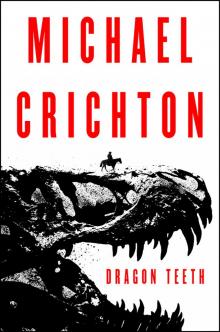 Dragon Teeth
Dragon Teeth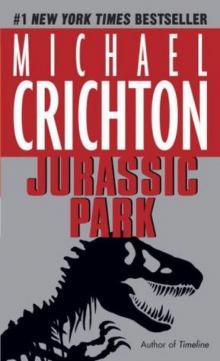 Jurassic Park
Jurassic Park Micro
Micro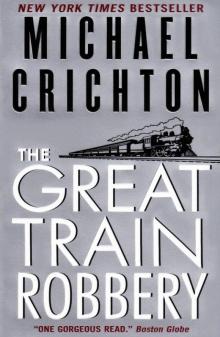 The Great Train Robbery
The Great Train Robbery The Andromeda Strain
The Andromeda Strain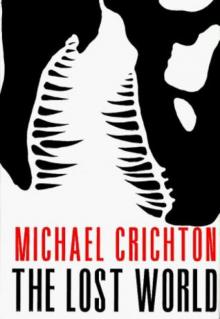 The Lost World
The Lost World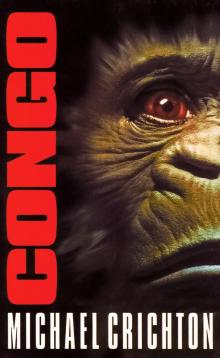 Congo
Congo Travels
Travels Timeline
Timeline Sphere
Sphere Westworld
Westworld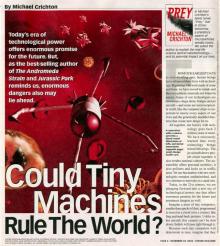 Prey
Prey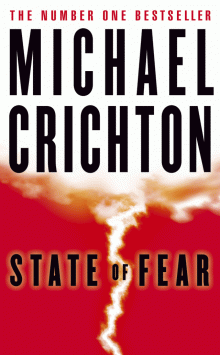 State Of Fear
State Of Fear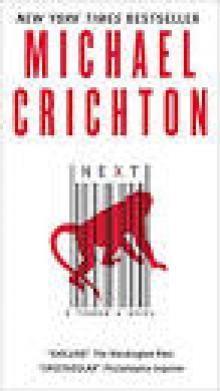 Next
Next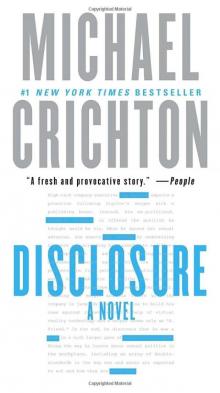 Disclosure
Disclosure Pirate Latitudes
Pirate Latitudes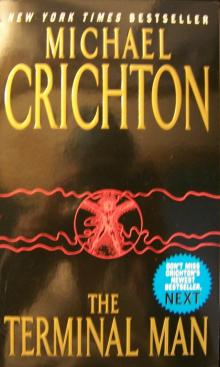 The Terminal Man
The Terminal Man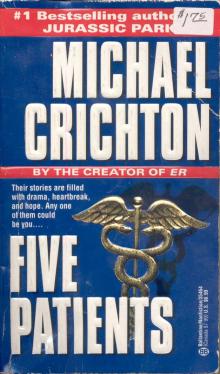 Five Patients
Five Patients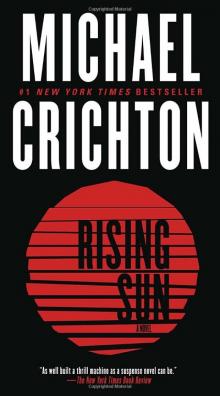 Rising Sun
Rising Sun Binary
Binary The Andromeda Evolution
The Andromeda Evolution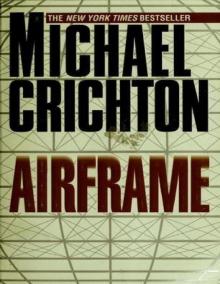 Airframe
Airframe Easy Go
Easy Go Drug of Choice
Drug of Choice Odds On: A Novel
Odds On: A Novel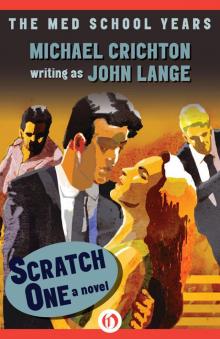 Scratch One
Scratch One Dealing or The Berkeley-to-Boston Forty-Brick Lost-Bag Blues
Dealing or The Berkeley-to-Boston Forty-Brick Lost-Bag Blues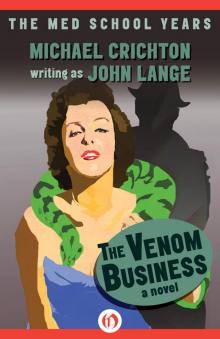 Venom Business
Venom Business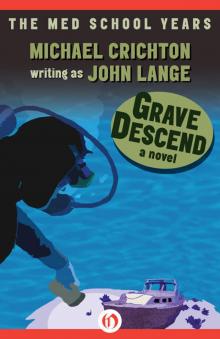 Grave Descend
Grave Descend Gold - Pirate Latitudes
Gold - Pirate Latitudes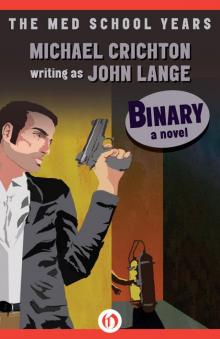 Binary: A Novel
Binary: A Novel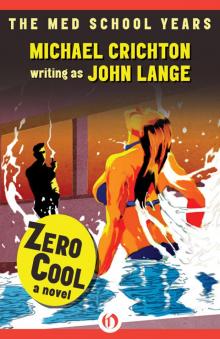 Zero Cool
Zero Cool Delos 1 - Westworld
Delos 1 - Westworld